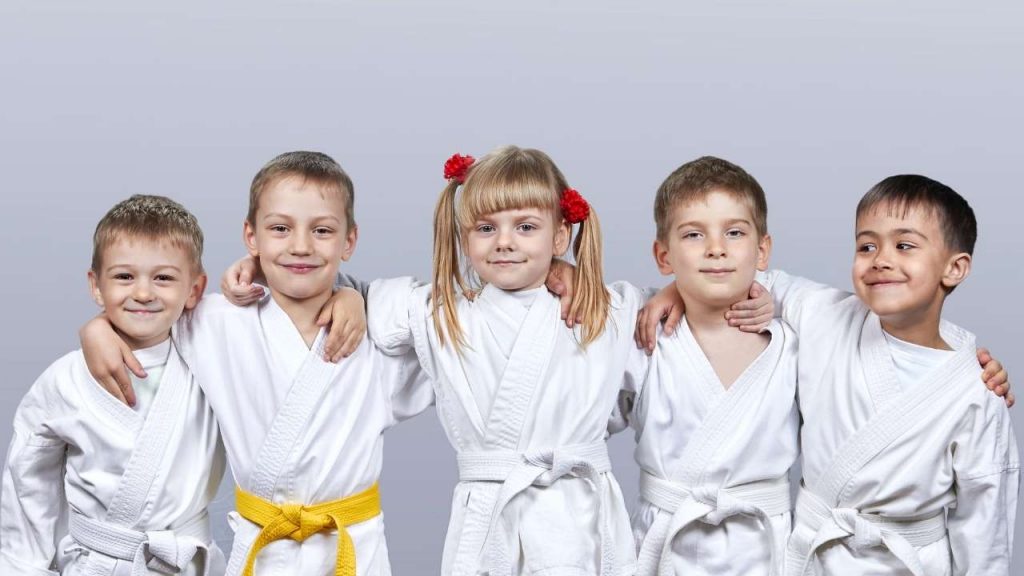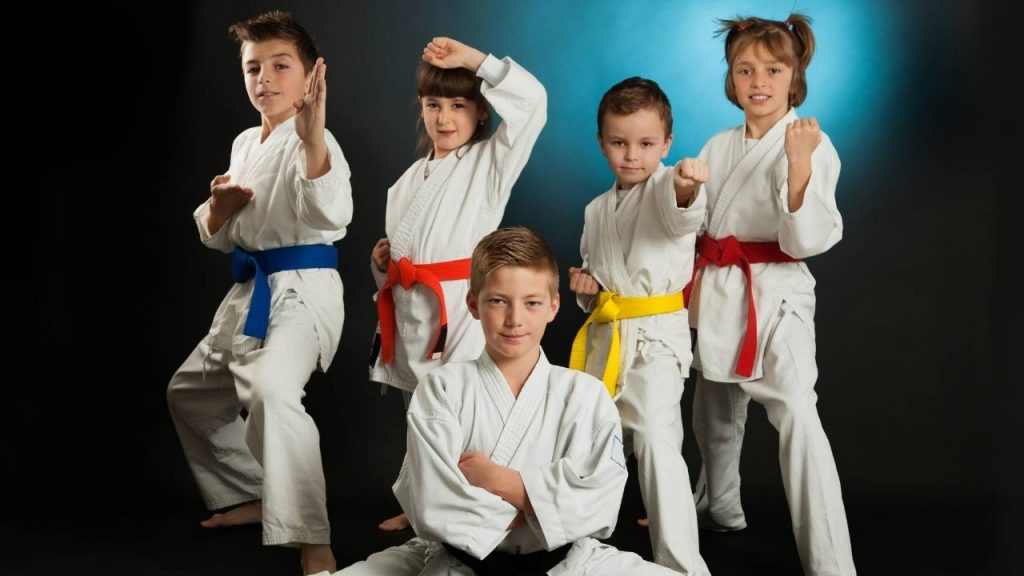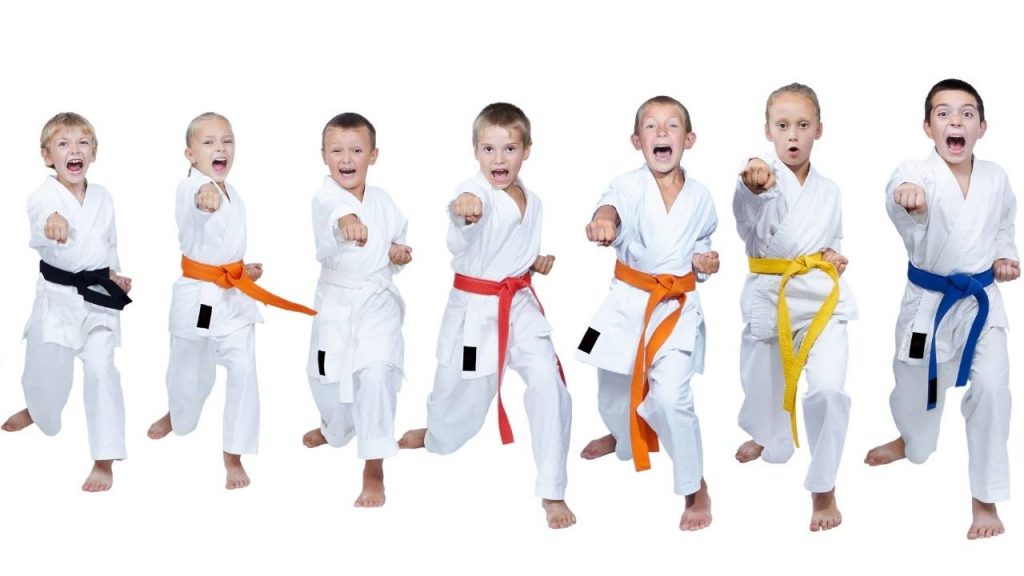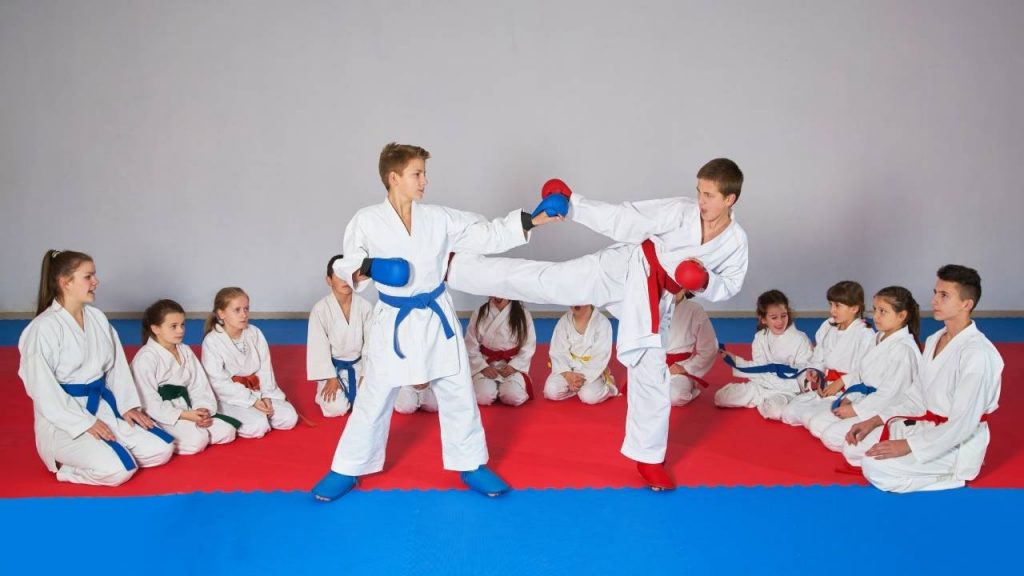What does Karate teach a child? Far more than you might expect if you’ve never delved into the martial arts world before.
Parents have various reasons for considering self-defense classes for kids. They can range from simply wanting them to be able to defend themselves to helping to manage behavioral issues or work through a traumatic experience.
But, is Karate good for kids?
Absolutely! While there are pros and cons to everything, there are a plethora of benefits of Karate for kids that parents should know if they are considering enrolling their child in martial arts.
Check out all the great benefits of Karate for kids as well as some things to be aware of here!

Table of Contents
Benefits of Karate for Kids
There is nearly no aspect of your child’s life where Karate won’t have an impact. The philosophy of Karate is far more than a sport and its benefits are far-reaching and interconnected. It’s almost hard to slow down and explain them all to you, but here we go!
1. Great Exercise
It’s a sad fact that most kids don’t get enough exercise these days. The average child spends about 7 ½ hours per day in front of a screen and only 1 in 3 kids get exercise each day. Considering this information, it’s not surprising that the obesity rate for kids hovers around 17%.
While it may not be surprising, it is saddening. Obesity is an underlying factor in numerous diseases and an obese person is statistically more likely to die at a younger age than a person of healthy weight. Furthermore, the risk increases exponentially the higher the person’s BMI (Body Mass Index).
One of the best ways you can keep your child healthy and help give them a long, happy life is by instilling healthy exercise habits in them. If you’ve ever taken a martial arts class, you know just how much good exercise you can get. You might even consider signing up with your child. After all, children learn the most by your example!
2. Safe Way to Burn off Energy
Sometimes kids just need to burn off excess energy or frustration. A martial arts class provides a safe place for them to do it.
Kids face all sorts of difficult situations, but they may not always know how to handle them or express how they feel about them. Sometimes, their parents may not even know the silent battle they are fighting.
Intense physical activity, as well as punching a mannequin or kicking a bag are excellent ways to release that pent up energy and emotion.
Research is also discovering that regular exercise can help many children who struggle with conditions such as ADHD control their symptoms with less or no need for medication.
3. Develop Hand-Eye Coordination
Though some people seem to develop their hand-eye coordination more rapidly, nobody is born with it. A newborn baby can’t reach out and pick up a rattle because their hand doesn’t know where it is in space, even though their eyes can see it.
This skill begins developing quickly, however, which is fantastic because it is integral to everything we do. Whether you want to catch a ball or drive a car, you need good hand-eye coordination to do it.
Of course, some people develop better hand-eye coordination than others. The good news is that anyone can improve it by participating in activities that require its use.
There’s the benefit of martial arts for kids. Learning to kick and punch accurately, as well as many of the physical movements help children further develop this essential skill.
4. Build Self-Confidence
Though there are many physical benefits of Karate, they don’t stop there. There are also many mental and emotional benefits of practicing the sport.
A big one is self-confidence.
Exercise is already good for your self-confidence. It stimulates the production of endorphins, dopamine, and other feel-good chemicals in the brain. When you feel good about yourself, it’s natural for your self-confidence to improve.
While the purpose of martial arts is not to incite violence, knowing that you can defend yourself against an attack is another major confidence booster.
Plus, there’s just something about breaking a board with your bare hands that makes you feel like you can take on the world!
5. Focus
We touched on this a bit already when we talked about ADHD, but let’s develop the thought further. Learning martial arts requires focus, determination, and memory. Children must be able to remember all the moves in the kata required to pass to the next level. They must be able to zero in on a target to strike it. And they must be able to fully focus on a sparring opponent.
As these skills develop in martial arts class, they will spill over into other areas of life. For example, it is common to see kids’ grades improve after beginning to study Karate.
6. Develop Self-Discipline and Respect
From the moment your child sets foot in a dojo, they will begin learning discipline and respect. A dojo is a place of respect, both towards the master and the other students. Students are taught to bow at certain times and to certain people as a signal of their respect. Talking out of turn and unruly behavior are not tolerated in a dojo.
As these principles begin to take root in your child, they spill over into other areas of their life. Respect for others grows into respect for themselves. A disciplined approach in class leads to a disciplined approach to life in general.
Make no mistake, the lessons learned in a dojo go far beyond just kicking and punching.

Potential Concerns about Karate
We’ve looked at a lot of benefits of practicing Karate and they seem fairly comprehensive. There are benefits that touch nearly every aspect of life.
Are there any pitfalls to watch out for?
While there are pros and cons to anything, finding the cons of Karate is pretty hard to do. However, there are a few concerns that parents should be aware of.
1. Time
The time commitment for Karate can be pretty intense. If your child gets a taste for the sport and really wants to excel, they will probably attend several classes a week.
While this is great for their physical and mental health in the ways we’ve mentioned, it can lead to poor performance in other areas — such as school. Parents should make sure that kids still have adequate time to do their homework and handle their other responsibilities.
Furthermore, some kids may wish to compete, which can turn into a major time-consuming activity for you. Most of the time spent at tournaments is sitting around and waiting for your turn. If you’ll be going as a spectator, definitely bring a book.
2. Discouragement
Some students may progress more slowly than others and become discouraged. This may be their own fault for not putting much effort into their training, or they may be physically or mentally challenged in some way. Regardless, it can have a negative impact on their mental state.
The important thing with this is to be sure to choose a dojo with high-quality instructors. Masters who are whole-heartedly invested in their craft will actively look for ways to motivate your child to put in more effort or make sure your child understands the techniques.
3. Injuries
Obviously, engaging in martial arts is inherently more physically dangerous than reading a book or some other type of sedentary activity. Bruises and strained or sore muscles are common. Less frequently, martial artists suffer pulled muscles or even broken bones.
However, the damage of a sedentary lifestyle can be far worse. This type of lifestyle contributes to cardiovascular disease, obesity, diabetes, and other major killers.
4. False Sense of Security
Some children may develop a false sense of security. As they grow in their abilities, they may start to feel like they can take care of themselves and take unnecessary risks. For example, walking through a dangerous neighborhood instead of avoiding it as they might do otherwise.
Again, the quality of instruction plays a significant role. While instructors should be empowering kids to feel confident in their abilities, they should also talk about balancing risks and only taking acceptable or necessary risks.

Is Karate Good for Kids? Frequently Asked Questions
We’ve discussed a lot of great information about the benefits and concerns associated with Karate classes for kids. Let’s look closer at a few questions that many parents ask about the subject.
1. Will Learning Karate Make my Child More Aggressive?
One of the tenets of Karate that you’ll hear in any dojo is to “never attack first”. More than just a sport, Karate is a way of life. It’s written right there in the full name Karate-do, which means “The Way of the Empty Hand” in Japanese.
The philosophy is about self-control, respect, discipline, and other noble traits — none of which fit in with an aggressive or bullying attitude.
In fact, children who act out or are already aggressive will usually benefit from getting into kids Karate. As we mentioned earlier, it gives them a safe space to let out their frustration and teaches them to have better self-control, thus approaching a situation more calmly.
2. Is Children’s Karate Good for My Special Needs Child?
Not everyone learns and thinks the same way. This is frustrating for those who struggle to follow the traditional way of learning.
Instructors who teach Karate classes for kids usually have an idea of how to work with different learning styles and explain concepts in creative ways. After all, the word “artist” appears in martial artist for a reason. Part of the philosophy is learning to be creative and adapt to different situations.
In other words, yes, children’s karate classes for kids with special needs can be very beneficial. The hand-eye coordination improvements and exercise can help these children learn and grow. Most importantly, the self-confidence they attain as they progress through the belts helps them more successfully face the other challenges in their lives.
3. Is Karate the Best Martial Art for Kids?
There are many forms of martial arts — Karate, Taekwondo, Kung Fu, Judo — to name a few. Each style has its pluses and minuses and its popularity tends to ebb and flows over time. Check out our post on the world’s most popular martial art to learn more about that.
We’re partial to Karate, of course. After all, we are The Karate Blog. However, when it comes to your child, the quality of the instruction that is available in your area should be your primary concern. A lot of people can teach kids martial arts, you need someone who can also teach your child what to do with it and the appropriate way to handle their training.
If you can find that in a Karate school near you, by all means, sign them up! But if the Tae Kwon Do dojo is a better fit, that’s fine too. The benefits your child will reap from any type of martial art are virtually the same.
Here is some great info on the top Karate schools for kids as well as what to look for in a school in your area.

The Road to Black Belt Can Begin Early
So, is Karate good for kids? We hope we’ve thoroughly answered your question.
Watching your kid be awarded a black belt in Karate will fill you with pride as a parent. Even more so because you know the hours of training, the sweat, and the tears that it took to reach that one special moment. Every belt ceremony before this was amazing as you watched your child grow, but this is the most epic one.
Even if your child never makes it to this moment, that’s okay. The important life lessons that Karate teaches begin on day one and are far more important than their status as a Black Belt.
Interested in helping them along in their journey at home? Check out these entertaining Karate games for kids here!


